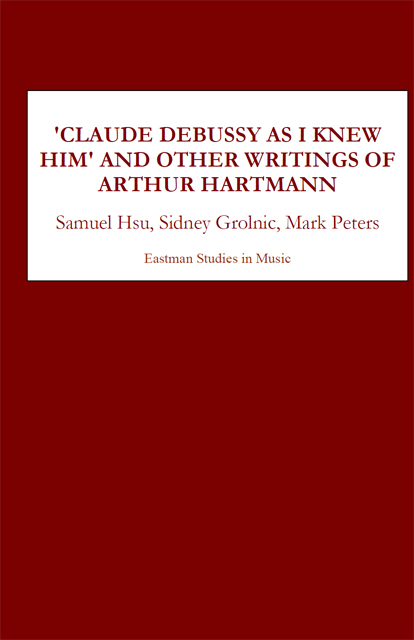Book contents
- Frontmatter
- Dedication
- Contents
- List of Photographs
- List of Facsimiles
- List of Music Examples
- List of Correspondence
- Foreword by David Grayson
- Preface
- Part 1 Arthur Hartmann
- Part 2 Claude Debussy
- Part 3 Other Writings of Arthur Hartmann
- Appendix A The Minstrels Manuscripts
- Appendix B Three Letters from Claude Debussy to Pierre Louÿs
- Arthur Hartmann: Catalogue of Compositions and Transcriptions
- Notes
- Archival Sources
- Bibliography
- Index
Appendix B - Three Letters from Claude Debussy to Pierre Louÿs
Published online by Cambridge University Press: 17 March 2023
- Frontmatter
- Dedication
- Contents
- List of Photographs
- List of Facsimiles
- List of Music Examples
- List of Correspondence
- Foreword by David Grayson
- Preface
- Part 1 Arthur Hartmann
- Part 2 Claude Debussy
- Part 3 Other Writings of Arthur Hartmann
- Appendix A The Minstrels Manuscripts
- Appendix B Three Letters from Claude Debussy to Pierre Louÿs
- Arthur Hartmann: Catalogue of Compositions and Transcriptions
- Notes
- Archival Sources
- Bibliography
- Index
Summary
Letter #1. 23 August 1895
Letter #2. 21 April 1898
Letter #3. Lundi Matin (“Cher Pierre, Peux-tu faire?”)
Introduction
In 1929 Hartmann purchased from a dealer on Rue de Clichy in Paris two autograph letters from Debussy to Pierre Louÿs, one dated 23 August 1895, and one undated. These letters must have been a source of comfort to Hartmann during his time of severe illness and exhaustion. On 9 April 1931, he obtained from Frank H. Ginn of Cleveland, Ohio, a photostat copy of another letter, dated 21 April 1898. These letters add significant details to the letters of Debussy and Louÿs published in Correspondance de Claude Debussy et Pierre Louÿs (1893–1904), edited by Henri Borgeaud (Paris: Librairie José Corti, 1945).
The letter of 23 August 1895 addresses several matters of interest. Annoyed by Debussy's excessive intrusion into the libretto for the opera Cendrelune, Louÿs had already told him on 12 May to write it himself: “Ecris TOI-MÊME Cendrelune” (Borgeaud, Correspondance de Debussy et Louÿs, 54). Yet, on 21 August, Louÿs still wanted to know when to begin working on it (Ibid., 59). Debussy's response: this is the time. The Louÿs novel mentioned in the letter was being published at the time in serial form in Mercure de France under the title L’Esclavage, and later in a single volume as Aphrodite. Debussy also alluded to three Nocturnes for violin and orchestra, a work intended for Eugène Ysaÿe. There is no trace of this work, although it may have been an earlier version of the Nocturnes for orchestra of 1897–99. Of historical significance is Debussy's statement: “Pelléas est terminé depuis le 17 août.” David Grayson points out that the 17 August date is confirmed by Debussy's own annotation on the short score of Act II and also in a letter to Henry Lerolle.
A portion of the 21 April 1898 letter was published by Borgeaud, pp. 110–11. The published portion begins with “Je t’assure que j’ai besoin de ton affection tellement je me sens seul et désemparé.” There are large deletions from the original text, and the published version ends with “Il y aurait là une spéciale coquetterie dont tu ne peux qu’approuver la charmante ironie.”
- Type
- Chapter
- Information
- Publisher: Boydell & BrewerPrint publication year: 2004

